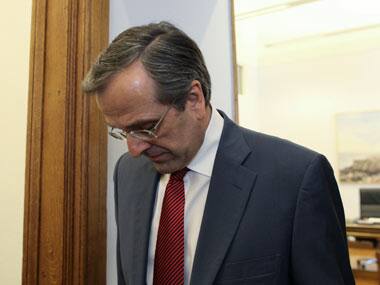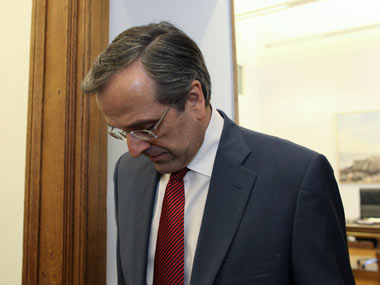When you have two pivotal nations voting on the same Sunday, it’s easy to see how contradictory Europe still is. For all the talk of unity in the euro zone for the benefit of the markets — and for all the good it does them — the continent is clearly pulling itself apart. Greece elected the centre-right and pro-euro party, New Democracy, on Sunday with about 30 per cent, followed by the far left Syriza party. [caption id=“attachment_348723” align=“alignleft” width=“380” caption=“Leader of conservative New Democracy party Antonis Samaras after the Greek elections. Reuters”]
 [/caption] This has been read by some as voter fear of withdrawing, or being pushed, out of the euro. However, half the population seems to be fed up with the extreme austerity measures imposed by Germany for the financial bailout package. With unemployment through the roof, inflation high, employees being given drastic pay cuts, if paid at all, you can’t be surprised by Greek anger. France appears angry too, though it has never attempted the level of austerity being imposed on Greece or even Spain. So on Sunday they elected a Socialist majority to the lower house to allow President Hollande to pursue his tax and spend policies. This can’t end well. France gets to tax and spend but Greece gets to suffer more cuts and austerity? Those are two political extremes in the euro zone and they’re pulling in opposite directions. The more the Greeks are forced to cut back while watching one of their lenders, France, spend more, will just increase the bitterness and likely further boost support for the far-right, anti-immigrant New Dawn party. Resentment of outsiders, and particularly those forcing societal change, is not going to decrease with headlines such as “world leaders hail Greece election result”. According to AFP, German Chancellor Angela Merkel said she proceeded from the principle that “Greece was going to respect its European obligations”. I’m sure the Greeks right now are thinking, “Well, that’s good eh? We’ve no jobs or money, but at least the Germans approve of us”. The divide isn’t even as simple as northern Euro zone and southern, because France and Germany are clearly taking differing paths as well. Even Germany might change direction if Merkel fails to win re-election next year. Talk of a fiscal union, of Europe drawing ever closer to a full federation, as a solution to the euro crisis isn’t very realistic when all the constituent countries can’t agree on monetary policy. And neither can their voters. A BBC report last week from just one Greek household showed support for three or four different parties. Little wonder voters don’t know what to do when economists, the markets, politicians and commentators don’t know what the answer is. This is not a criticism of voters in any country. They vote as they see fit and then politicians must make policy accordingly. But we should not expect the markets to settle down simply because Greece elected a centre-right party, as Merkel seems to think. And the market speculators are so nervous about anything these days, that they will continue to sell no matter who voters go for. My opinion is they are still more to blame for the current mess and turmoil than any electoral choice or government policy. Nothing will ever satisfy the markets. What we can say for certain is that ordinary Greeks are suffering and will continue to for many more years, regardless of whether they are in or out of the euro. But with such divergent votes across Europe, with parts of Europe spending and others cutting, they may have one currency, but they don’t have equal access to it.
[/caption] This has been read by some as voter fear of withdrawing, or being pushed, out of the euro. However, half the population seems to be fed up with the extreme austerity measures imposed by Germany for the financial bailout package. With unemployment through the roof, inflation high, employees being given drastic pay cuts, if paid at all, you can’t be surprised by Greek anger. France appears angry too, though it has never attempted the level of austerity being imposed on Greece or even Spain. So on Sunday they elected a Socialist majority to the lower house to allow President Hollande to pursue his tax and spend policies. This can’t end well. France gets to tax and spend but Greece gets to suffer more cuts and austerity? Those are two political extremes in the euro zone and they’re pulling in opposite directions. The more the Greeks are forced to cut back while watching one of their lenders, France, spend more, will just increase the bitterness and likely further boost support for the far-right, anti-immigrant New Dawn party. Resentment of outsiders, and particularly those forcing societal change, is not going to decrease with headlines such as “world leaders hail Greece election result”. According to AFP, German Chancellor Angela Merkel said she proceeded from the principle that “Greece was going to respect its European obligations”. I’m sure the Greeks right now are thinking, “Well, that’s good eh? We’ve no jobs or money, but at least the Germans approve of us”. The divide isn’t even as simple as northern Euro zone and southern, because France and Germany are clearly taking differing paths as well. Even Germany might change direction if Merkel fails to win re-election next year. Talk of a fiscal union, of Europe drawing ever closer to a full federation, as a solution to the euro crisis isn’t very realistic when all the constituent countries can’t agree on monetary policy. And neither can their voters. A BBC report last week from just one Greek household showed support for three or four different parties. Little wonder voters don’t know what to do when economists, the markets, politicians and commentators don’t know what the answer is. This is not a criticism of voters in any country. They vote as they see fit and then politicians must make policy accordingly. But we should not expect the markets to settle down simply because Greece elected a centre-right party, as Merkel seems to think. And the market speculators are so nervous about anything these days, that they will continue to sell no matter who voters go for. My opinion is they are still more to blame for the current mess and turmoil than any electoral choice or government policy. Nothing will ever satisfy the markets. What we can say for certain is that ordinary Greeks are suffering and will continue to for many more years, regardless of whether they are in or out of the euro. But with such divergent votes across Europe, with parts of Europe spending and others cutting, they may have one currency, but they don’t have equal access to it.
Tristan Stewart-Robertson is a journalist based in Glasgow, Scotland. He writes for Firstpost on the media, internet and serves as an objective, moral compass from the outside.
)